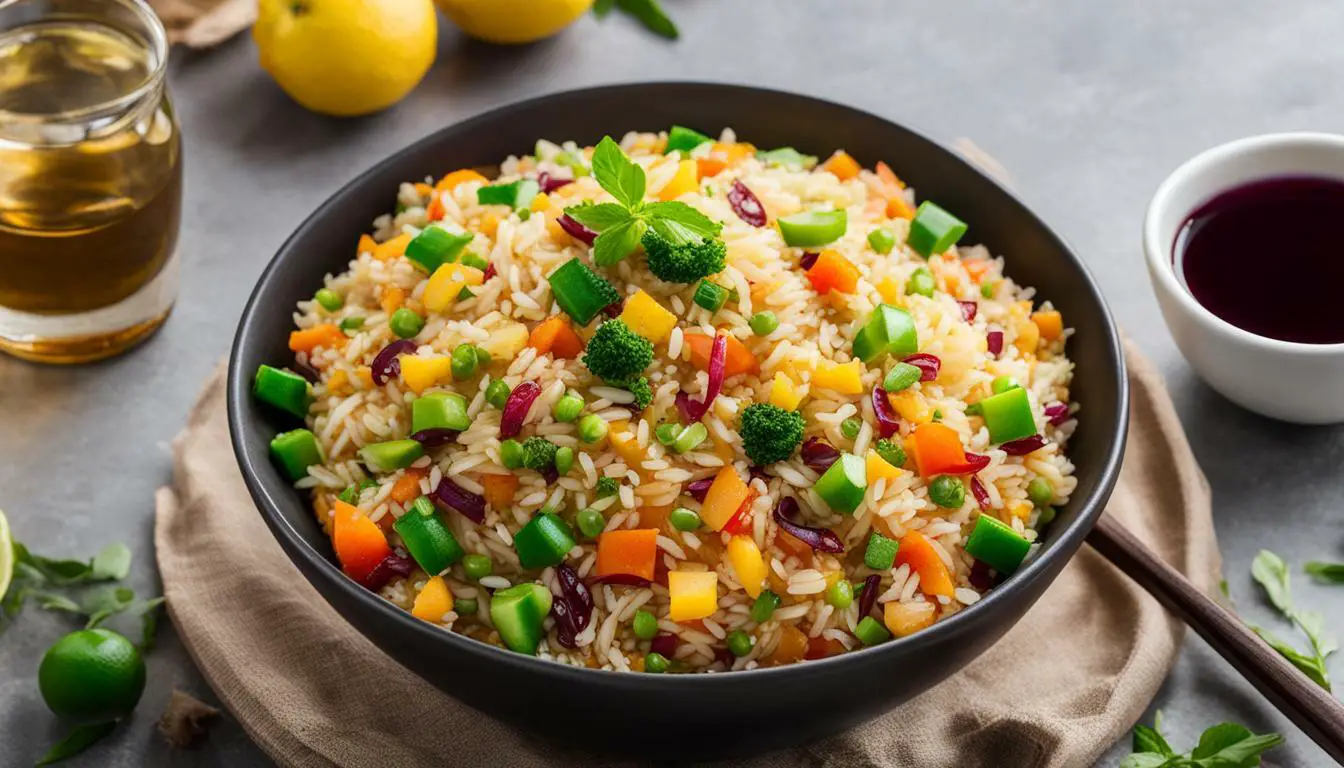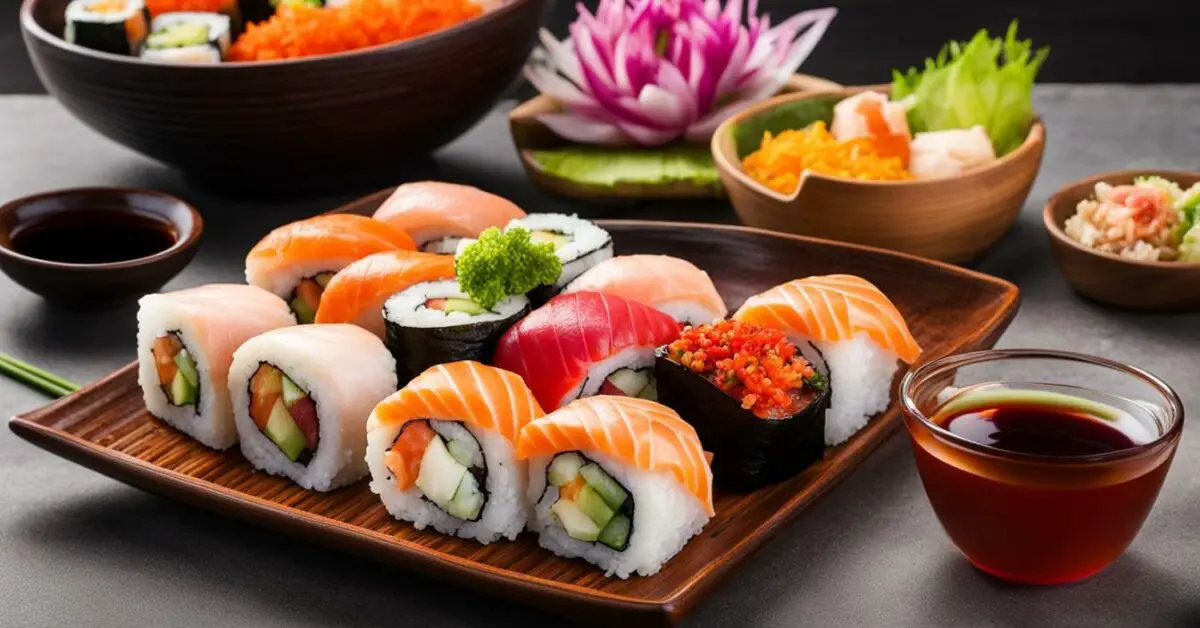
This post may contain affiliate links. Please read my disclosure for more information.
Looking for the perfect substitute for vinegar in your fried rice? Look no further! We’ve got you covered with these seven ideal alternatives.
When you don’t have rice vinegar on hand, these substitutes can elevate the flavors of your fried rice without compromising its taste.
First up, we have apple cider vinegar. With its slightly sweet flavor, it can be used in a 1:1 ratio as a delicious substitute for rice vinegar. Not only that, it’s also a great addition for pickling recipes.
If you prefer a milder flavor, white wine vinegar is the way to go. Use it in a 1:1 ratio to achieve the same acidity level as rice vinegar, without overpowering your fried rice.
For those looking to add a unique touch to their fried rice, champagne vinegar is a perfect choice. It pairs exceptionally well with seafood marinades and sauces.
Sherry vinegar, on the other hand, offers a subtle sweetness and nuttiness that can enhance the flavors of your fried rice. Use it in a 1:1 ratio to achieve the desired taste.
If you’re a fan of citrus flavors, look no further than lemon or lime juice. Add them in a 2:1 ratio to rice vinegar, or to taste, to introduce a refreshing twist to your dish.
Rice wine, with its umami flavor, is another fantastic substitute for rice vinegar. Use it in a 1:1 ratio and enjoy its unique sweetness.
However, it’s important to note that white vinegar is not recommended as a first choice substitute. Its harsh acidity can overpower the delicate flavors of your fried rice.
So, the next time you find yourself without rice vinegar, remember these seven ideal alternatives. They offer a range of flavors and acidity levels to suit your preferences and elevate your fried rice to new heights.
Apple Cider Vinegar
If you’re looking for a substitute that adds a hint of sweetness, apple cider vinegar is the way to go. This versatile ingredient can be used in a 1:1 ratio as a substitute for rice vinegar in fried rice recipes. It brings a slightly sweet flavor that adds depth to your dish and can also be used in pickling recipes for an extra tangy kick.
How to Use Apple Cider Vinegar:
- Use a 1:1 ratio of apple cider vinegar to rice vinegar as a direct substitute in your fried rice recipe.
- Experiment with different flavors by incorporating apple cider vinegar into homemade pickling recipes.
Tips:
- Choose raw, unfiltered apple cider vinegar for the best flavor and health benefits.
- Adjust the amount of apple cider vinegar according to your taste preference.
With its slightly sweet flavor and versatile uses, apple cider vinegar is a great substitute for rice vinegar in fried rice recipes. Whether you’re looking to add a touch of sweetness or experiment with pickling, apple cider vinegar will elevate your dish and provide a unique flavor profile.
White Wine Vinegar
For a subtle tang without overpowering the dish, white wine vinegar is an excellent substitute for rice vinegar. It can be used in a 1:1 ratio, ensuring that the flavors of your fried rice remain balanced. With its mild flavor, white wine vinegar won’t dominate the other ingredients, allowing them to shine through.
White wine vinegar pairs well with a variety of dishes and can add a touch of sophistication to your fried rice. Its delicate flavor lends itself well to seafood marinades and sauces, complementing the flavors without overpowering them.
When using white wine vinegar as a substitute for rice vinegar, keep in mind that it may not provide the exact same flavor profile. However, it offers a delightful alternative that can elevate your fried rice and add a subtle tang that’s sure to impress.
Champagne Vinegar: A Touch of Elegance for Your Fried Rice
If you’re looking to elevate your fried rice with a touch of elegance, champagne vinegar is the perfect substitute. Its delicate flavor and unique characteristics make it a standout choice for adding a sophisticated twist to your dish.
When used in a 1:1 ratio with rice vinegar, champagne vinegar pairs exceptionally well with seafood marinades and sauces. Its subtle nuances can enhance the flavors of your fried rice, creating a harmonious blend of taste sensations.
Derived from the finest grapes, champagne vinegar offers a delicate balance of acidity and sweetness, adding depth and complexity to your dish. Its light and crisp notes bring out the natural flavors of the ingredients, making every bite a delightful experience.
Why Choose Champagne Vinegar?
- Enhances seafood flavors: If you’re a seafood lover, champagne vinegar is the perfect companion for your fried rice. Its aromatic and fruity undertones complement the delicate flavors of seafood, taking your dish to new heights.
- Elevates sauces and marinades: Whether you’re preparing a tangy sauce or a flavorful marinade, champagne vinegar adds a refined touch. Its subtle sweetness and crisp acidity elevate the overall taste, transforming ordinary fried rice into a gourmet delight.
- Imparts a touch of luxury: Just as champagne is associated with celebrations and luxury, champagne vinegar brings an air of sophistication to your cooking. It’s the perfect ingredient to impress your guests or simply indulge in a culinary treat.
In conclusion, if you’re seeking a substitute for vinegar in your fried rice that adds a touch of elegance, look no further than champagne vinegar. Its delicate flavor, versatility, and ability to enhance seafood marinades and sauces make it an ideal choice for elevating your dish. So, why not infuse your fried rice with a hint of luxury and give champagne vinegar a try?
Sherry Vinegar: A Touch of Sophistication for Your Fried Rice
Give your fried rice a touch of sophistication with the subtle sweetness and nuttiness of sherry vinegar. This ideal substitute for vinegar in fried rice can elevate the flavors of your dish, adding complexity and depth. Use it in a 1:1 ratio as a replacement for rice vinegar, and you’ll be pleasantly surprised by the results.
Sherry vinegar offers a unique flavor profile that perfectly complements the ingredients in fried rice. Its subtle sweetness enhances the natural sweetness of vegetables, while the nuttiness adds a delightful twist. It strikes a delicate balance, providing just the right amount of acidity without overpowering the other flavors in the dish.
To incorporate sherry vinegar into your fried rice recipe, simply swap it in for the rice vinegar in equal proportions. Whether you’re cooking up a classic vegetable fried rice or experimenting with different proteins like shrimp or chicken, sherry vinegar can add a sophisticated touch that takes your dish to the next level.
Lemon or Lime Juice: A Burst of Refreshing Citrus Flavor
For a burst of refreshing citrus flavor in your fried rice, lemon or lime juice is the perfect substitute for rice vinegar. Not only does it add the needed acidity to the dish, but it also leaves a distinct and vibrant citrus taste that can elevate the overall flavor profile.
To use lemon or lime juice as a substitute, simply replace rice vinegar with a 2:1 ratio of citrus juice. You can adjust the amount to taste, depending on how tangy you prefer your fried rice to be.
- Tip: Squeeze the juice from fresh lemons or limes for the best and most natural flavor.
Benefits of Using Lemon or Lime Juice
- Refreshingly Tangy: The citrus juice adds a refreshing tang that complements the other flavors in the dish.
- Naturally Brightens: The acidity of the juice helps to brighten and enhance the overall taste of the fried rice.
- Versatile and Accessible: Lemon or lime juice is readily available in most households and can be easily substituted for rice vinegar in a pinch.
So, the next time you find yourself without rice vinegar, reach for a lemon or lime instead. Your fried rice will thank you for the burst of citrusy goodness!
Rice Wine: An Excellent Substitute for Rice Vinegar in Fried Rice
If you want to maintain the umami flavor in your fried rice while adding a touch of sweetness, rice wine is an excellent substitute for rice vinegar. With its unique flavor profile, rice wine can elevate your dish to new heights. Here are some key points to consider:
- Use a 1:1 ratio: In order to achieve the best results, substitute rice wine for rice vinegar in a 1:1 ratio. This ensures that the flavors are properly balanced and that the dish maintains its intended taste.
- Similar umami flavor: Rice wine shares a similar umami flavor with rice vinegar, making it a suitable replacement. It adds depth and complexity to your fried rice, enhancing the overall taste experience.
- Touch of sweetness: Rice wine brings a subtle sweetness to the dish, which can complement the savory notes of the fried rice. This hint of sweetness adds a delicate balance to the flavors, creating a more enjoyable culinary experience.
When using rice wine as a substitute, it is important to note that it may be slightly sweeter than rice vinegar. As a result, you may want to adjust the amount according to your personal taste preferences. Adding rice wine to your fried rice can take your dish to a whole new level, providing a unique and delightful flavor profile.
White Vinegar
While white vinegar can be used in various recipes, it is not the ideal substitute for rice vinegar in fried rice due to its harsh acidity. The strong acidic flavor of white vinegar can overpower the delicate flavors of the dish, resulting in an unbalanced taste. However, if you find yourself without any other options, it can be used sparingly as a last resort.
If you do decide to use white vinegar as a substitute, it is crucial to dilute it with water or another milder liquid to lessen its harshness. Start by using a smaller amount and taste as you go, gradually adding more if needed. Remember that the purpose of using a substitute is to enhance the flavors of your fried rice, so use white vinegar sparingly to avoid overpowering the dish.
Overall, it is best to explore other alternatives mentioned earlier, such as apple cider vinegar, white wine vinegar, or lemon and lime juice, which provide milder flavors and complement the taste of fried rice more effectively. Experimenting with different substitutes will allow you to create delicious fried rice dishes that suit your taste preferences.
Conclusion
Don’t let the absence of rice vinegar stop you from enjoying delicious fried rice – with these substitutes, you can still achieve amazing flavor and enhance your dish. Whether you opt for a slightly sweet apple cider vinegar, a mild white wine vinegar, or the unique touch of champagne vinegar in your seafood marinades, there are several ideal alternatives to choose from.
If you prefer a subtle sweetness and nuttiness, sherry vinegar can elevate the flavors of your fried rice. For a citrus twist, lemon or lime juice can provide acidity and a distinct flavor. Rice wine, with its umami notes and slight sweetness, is another great option for achieving a similar flavor profile to rice vinegar.
However, it’s important to note that white vinegar is not recommended as a first choice substitute due to its harsh acidity, which can overpower the delicate flavors of fried rice.
With these seven ideal alternatives at your disposal, you can experiment with different flavors and acidity levels to create a fried rice dish that suits your taste preferences. Enjoy exploring the world of substitutes for vinegar in fried rice and elevate your cooking to new heights!
FAQ
Can apple cider vinegar be used as a substitute for rice vinegar in fried rice?
Yes, apple cider vinegar can be used as a substitute for rice vinegar in a 1:1 ratio. It adds a slightly sweet flavor and can also be used in pickling recipes.
What is a good alternative to rice vinegar in fried rice?
White wine vinegar can be used as a substitute for rice vinegar in a 1:1 ratio. It has a milder flavor that won’t overpower the dish.
Can champagne vinegar be used in fried rice?
Yes, champagne vinegar can be used as a substitute for rice vinegar in a 1:1 ratio. It pairs well with seafood marinades and sauces.
What can I use instead of rice vinegar in fried rice?
Sherry vinegar is a good substitute for rice vinegar in a 1:1 ratio. It has a subtle sweetness and nuttiness that can enhance the flavors of your fried rice.
Can lemon or lime juice be used as a substitute for rice vinegar in fried rice?
Yes, lemon or lime juice can be used as a substitute for rice vinegar in a 2:1 ratio or to taste. It adds acidity and leaves a distinct citrus flavor.
Is rice wine a suitable substitute for rice vinegar in fried rice?
Yes, rice wine can be used as a substitute for rice vinegar in a 1:1 ratio. It adds a similar umami flavor but can be slightly sweeter.
Can I use white vinegar as a substitute for rice vinegar in fried rice?
White vinegar is not recommended as a first choice substitute, as it is too harsh and acidic for fried rice.


